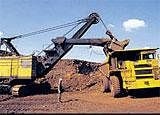
Though the terms of reference of the commission are yet to be announced, the probe panel to be headed by a retired Supreme Court judge, will submit its report within 18 months. The Cabinet decision came in the wake of several meetings the Prime Minister’s Office held with senior Mines Ministry officials. The panel will be governed by the provisions of the Commissions of Inquiry Act, 1952, under which a probe can be initiated into any “definite matter of public importance.”
Announcing the decision, Union Mines Minister B K Handique said: “The Cabinet on Monday approved a proposal for setting up a commission to check illegal mining in the country, in Karnataka and other mineral producing states.”
The Union Cabinet’s decision had an immediate impact on the Karnataka government with Chief Minister B S Yeddyurappa, who has blown hot and cold over the issue of illegal mining and the alleged involvement of the Reddys in it, reiterating that the system of issuing bulk permits for transporting iron ore will be abolished and a new, transparent system will be introduced.
Speaking to reporters after a meeting with the officials of the Mines and Geology and the Forest departments at Vidhana Soudha in Bangalore, Yeddyurappa said it will be made mandatory for every truck that carries iron ore to have a separate permit under the new system. The State recently stopped issuing fresh export permits to curb illegal mining.
Union Mines Ministry officials said “the Centre will soon issue the terms and reference for the Commission to enable its early functioning”. Accordingly, the mines ministry will soon write to the Chief Justice of India and request him to recommend a retired Supreme Court judge to head the panel.
The panel will not only probe into the illegal mining but also recommend curbing of such operations. Members of the public who possess knowledge about illegal mining will also be able to register their complaints with the commission.
Of late, illegal mining, especially in Karnataka, has turned into a national scandal, amid allegations that lakhs of tonnes of public owned iron ore have been pilfered and exported out of the country by using questionable papers and clearances, a process that has benefited mining barons like the Reddy brothers who are ministers in the Yeddyurappa Cabinet.
Karnataka, however, is not the only state where allegations of Illegal mining operations have emerged. Orissa and Jharkhand are other states from where there have been reports of illegal mining.
Handique has been consistently writing to Yeddyurappa, asking him to hand over investigations to the CBI. The mines minister also informed the Rajya Sabha on Monday that the Centre is preparing a new Mines Act which has a separate section that seeks to put an end to illegal mining.
Once this authority comes into force, the Centre will be able to terminate the leases issued to mine owners found involved in illegal mining in the event of states not acting against them, he said. “Any citizen can become a whistleblower and special courts can also be formed for prosecuting offenders under its provisions,” he said.
There is no proposal before the government to impose a ban on export of iron ore. As the iron ore exported from India is low grade, the domestic steel industry does not possess the technology to utilise it. Handique said his ministry will evolve new mechanisms to provide 26 per cent share from mining profits to indigenous inhabitants in states where mines are operated. The proposed Mines and Minerals Bill, 2010, will ensure that issues relating to ecological balance are also kept in mind.“Tribals will be given a share from mining profits. We have earmarked 26 per cent share from mining profits for them,” he said.